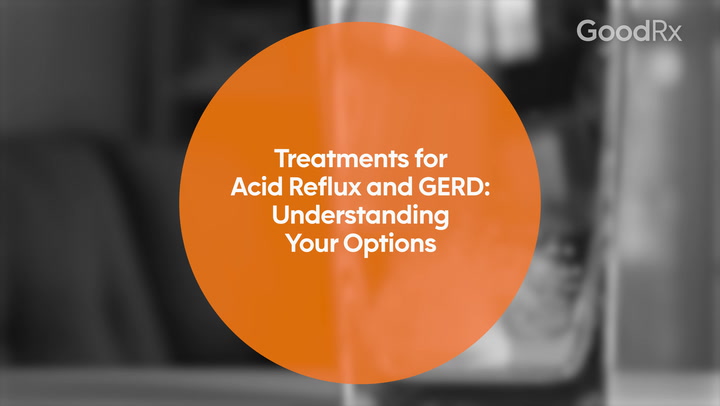
The Best Probiotics for GERD (Acid Reflux) and Heartburn
Key takeaways:
Certain types of probiotics may improve heartburn symptoms. More research is needed to confirm the right dosage for treatment.
Lactobacillus acidophilus and Bifidobacterium strains are the most studied probiotics for acid reflux and heartburn.
You can find probiotics in fermented foods, yogurt, and probiotic supplements.
Table of contents

Probiotics are “good” bacteria that you can get through foods, drinks, and pill supplements. Probiotics may help with a variety of medical problems, especially ones that involve the stomach and gut. This includes GERD (gastroesophageal reflux disease), which people often call “acid reflux.” This is one of the main reasons that people experience heartburn.
Although more studies are needed, researchers have found a few specific types of probiotics that appear to be especially helpful for treating GERD and heartburn.
1. Lactobacillus strains
One of the most helpful probiotics is also the most readily available. Probiotic supplements containing Lactobacillus acidophilus and other Lactobacillus strains are commonly used for heartburn and reflux symptoms. These bacteria are found in over-the-counter (OTC) probiotic pills, yogurt, sauerkraut, kimchi, and fermented soy products.
Other Lactobacillus may have similar benefits, including:
L. gasseri
L. casei
L. plantarum
L. rhamnosus
L. reuteri
Since a lot of probiotic supplements contain more than one strain, it’s hard to sort out how much of the benefit comes from a particular strain.
Probiotics 101: There are lots of claims about the health benefits of probiotics. Here are common uses and what the research shows.
OTC heartburn meds: You don’t need a prescription for all heartburn medications. A pharmacist reviews the best over-the-counter (OTC) options.
Can exercise improve acid reflux? Yes, here’s how physical activity can help improve GERD naturally.
Researchers believe Lactobacillus strains may help with heartburn by reducing stomach acid and improving digestion.
2. Bifidobacterium strains
Bifidobacterium animalis, subspecies lactis (formerly called B. lactis), is a common bacteria in probiotic supplements. It’s well known for promoting digestive health, and research shows it can help protect the inside of the stomach against the effects of acid. People use it to treat constipation, irritable bowel syndrome (IBS), heartburn, and GERD symptoms.
Outside of pill form, it also can be found in fermented milk products such as kefir (more on this below). Other Bifidobacterium strains — such as B. bifidum and B. longum — have also been used successfully to treat acid reflux. As with Lactobacillus strains, they are often found in combination, so it’s hard to say if one particular strain of Bifidobacterium is best.
3. Kefir
Kefir is a fermented milk product that has the consistency of very thin yogurt. You can usually find it in the yogurt or milk section of the grocery store. It can be an acquired taste. But once you get used to it, kefir can be quite delicious.
Kefir contains a variety of probiotics. Some examples include:
Lactococcus species
Streptococcus thermophilus
Lactobacillus species
Acetobacter species
Yeast species
Kefir is believed to have a list of health benefits. Given the research on some of these probiotic strains, it’s possible that kefir might help with GERD and heartburn symptoms. But no studies have specifically studied whether consuming kefir can directly affect symptoms of acid reflux.
4. Prebiotics
Prebiotics are a little different from probiotics, but they’re an important ingredient for healthy gut bacteria. Prebiotics are the food that bacteria use to multiply and thrive. Examples include:
Inulin
Chicory root
Berries
Whole grains
One prebiotic supplement — maltosyl-isomalto-oligosaccharides — has been shown to significantly lessen GERD symptoms. A couple of participants who had been taking heartburn medications for a long time were able to stop using medications completely once they started taking the prebiotic supplement regularly.
But this is very early research, and larger studies are needed. It would certainly be exciting if a fiber supplement was able to relieve GERD symptoms better than medications.
Are there side effects of using probiotics for acid reflux?
Fortunately, probiotic use is relatively low risk. The biggest downside is probably the cost, since insurance may not cover probiotics. Some people might report worsening of digestive symptoms when they first start taking a probiotic. This includes gas, diarrhea, constipation, or bloating. But these side effects are usually temporary.
Gradually introducing probiotic-rich foods may help limit these unpleasant effects. It’s also worth noting that people who experience IBS may have trouble with some prebiotic foods.
Can other supplements help acid reflux and heartburn?
People have tried a number of different home remedies and alternative treatments for heartburn. But many of them don’t have any scientific evidence to suggest they work. Here’s a quick rundown of some of the most popular ones:
Aloe vera: You can take aloe vera in pill or liquid form to soothe the stomach. In one small study, it worked as well as a standard medication for heartburn.
Amino acids: In one study on rats, L-arginine and glycine protected against GERD. In contrast, other amino acids — such as glutamine and alanine — made acid reflux symptoms worse in rats. Whether this is true for humans is a matter of debate.
Ginger: Ginger is useful for a variety of stomach ailments, and researchers are becoming more interested in its effect on GERD. In some studies, it works well when combined with peppermint.
Magnesium: Almost half of the U.S. population has low levels of magnesium. Increasing dietary magnesium may protect against acid reflux and GERD in some populations.
Digestive enzymes: While it makes sense that improved digestion might eliminate heartburn, there’s not a lot of evidence behind this one. But if you’re among the 1 in 3 people in the U.S. estimated to have lactose intolerance, taking the digestive enzyme lactase may help you tolerate dairy products.
Sodium bicarbonate: Sodium bicarbonate, or baking soda, neutralizes acid. So it can help temporarily relieve the effects of heartburn. But it doesn’t have a permanent effect.
Silicol gel: This product is marketed to help with GERD and heartburn. But there’s little scientific evidence that silicol gel is helpful.
Other lifestyle changes that can help with GERD and heartburn
Lifestyle plays a big role in GERD and heartburn. You can help prevent GERD from starting in the first place by:
Limiting heavy, spicy, greasy, and acidic foods
Sticking to a low-carbohydrate diet
Eating small meals to reduce stomach stretch (gastric distension)
Avoiding or limiting tobacco, alcohol, and caffeine
Keeping your body upright after eating, and raising the head of your bed
Staying physically active
Maintaining a comfortable body weight for you
If you’re already experiencing symptoms, there are a few home remedies that may help lessen GERD. Here are some things to try:
Take a deep breath and hold it. This may relieve heartburn by lowering your diaphragm and esophagus, which can temporarily lessen how much stomach acid leaks back up into your esophagus.
Eat a banana. Bananas and other alkaline foods like melons, cauliflower, and nuts can “neutralize” stomach acid and may add a protective coat to the lining of your esophagus. And this might lessen heartburn symptoms.
Drink a glass of skim milk. Milk is less acidic than the inside of your stomach, so it can help eliminate the burning feeling of heartburn. Fats are acidic, though, so skim milk works better than whole milk for this.
Chew some sugar-free gum. Chewing gum triggers saliva production, which increases swallowing. In some people this can help move stomach acid away from your esophagus.
More potential benefits of probiotics
Scientists continue to study the possible benefits of probiotic supplements as well as probiotic-rich foods and drinks. There’s a lot of interest in probiotics and gut health. But there isn’t enough evidence to support using probiotics for most digestive disorders, according to the American Gastrointestinal Association (AGA). For example, the AGA doesn’t recommend probiotics to treat IBS.
But researchers continue to study how probiotics may help with a range of conditions, including:
Lessening the risk of vaginal yeast infections
Lowering cholesterol levels (when used along with other therapies)
Improving blood sugar management (when used along with other therapies)
Frequently asked questions
Yogurt with probiotics may lessen symptoms of acid reflux and heartburn. But there aren't specific studies looking at this. Though the calcium in yogurt may help neutralize acidity.
Keep in mind that there are lots of types of yogurt, and not all of them contain probiotics. Plus, some yogurts are better for you than others. Watch out for options that have a lot of added ingredients, like sugar and artificial or natural colors and sweeteners.
Probiotics are an important part of maintaining a balanced gut microbiome and protecting the stomach lining. And lots of these can affect your gut health. Depending on what’s causing your stomach lining to be damaged, probiotics may form part of your treatment plan. But it’s important to connect with a healthcare professional to figure out the best approach for you.
There are lots of probiotic-rich foods, and you can work them into your meals or snacks as best fits your schedule. When it comes to probiotic supplements for acid reflux, there’s no clear recommendation on when to take them. So, if your primary care provider has given you the OK, the best time to take probiotics is when you’ll remember to take them.
The bottom line
According to current research, the best probiotics for acid reflux are generally from the Lactobacillus and Bifidobacteria species. You can get these from food or from supplements. Along with following a healthy lifestyle and avoiding heartburn triggers, these probiotics may help people experiencing GERD and acid reflux to feel better. But more research is needed before we can say with confidence exactly which strains and amounts of probiotics are best.
Why trust our experts?



References
Ali, R. A. R., et al. (2022). Review of recent evidence on the management of heartburn in pregnant and breastfeeding women. BMC Gastroenterology.
American Gastroenterological Association. (2020). AGA does not recommend the use of probiotics for most digestive conditions.
Azizi, N. F., et al. (2021). Kefir and its biological activities. Foods.
Bourrie, B. C. T., et al. (2016). The microbiota and health promoting characteristics of the fermented beverage kefir. Frontiers in Microbiology.
Cheng, J., et al. (2020). Gastroesophageal reflux disease and probiotics: A systematic review. Nutrients.
Cheng, J., et al. (2021). Bifidobacterium animalis subsp. lactis HN019 effects on gut health: A review. Frontiers in Nutrition.
Dai, Q., et al. (2015). Dietary magnesium, calcium:magnesium ratio and risk of reflux oesophagitis, Barrett’s oesophagus and oesophageal adenocarcinoma: A population-based case–control study. British Journal of Nutrition.
Gibson, P. R., et al. (2020). Review article: FODMAPS, prebiotics and gut health-the FODMAP hypothesis revisited. Alimentary Pharmacology & Therapeutics.
Gordon, M., et al. (2023). Probiotics for the management of functional abdominal pain disorders in children. Cochrane Evidence Synthesis and Methods.
Herdiana, Y. (2023). Functional food in relation to gastroesophageal reflux disease (GERD). Nutrients.
Kechagia, M., et al. (2013). Health benefits of probiotics: A review. ISRN Nutrition.
Kerry, R. G., et al. (2018). Benefaction of probiotics for human health: A review. Journal of Food and Drug Analysis.
Lakananurak, N., et al. (2024). The efficacy of dietary interventions in patients with gastroesophageal reflux disease: A systematic review and meta-analysis of intervention studies. Nutrients.
Nagahama, K., et al. (2012). Orally administered L-arginine and glycine are highly effective against acid reflux esophagitis in rats. Medical Science Monitor.
National Institute of Diabetes and Digestive and Kidney Diseases. (2018). Definition & facts for lactose intolerance.
Panahi, Y., et al. (2015). Efficacy and safety of aloe vera syrup for the treatment of gastroesophageal reflux disease: A pilot randomized positive-controlled trial. Journal of Traditional Chinese Medicine.
Rosanoff, A., et al. (2012). Suboptimal magnesium status in the United States: Are the health consequences underestimated? Nutrition Reviews.
Ruan, Y., et al. (2015). Effect of probiotics on glycemic control: A systematic review and meta-analysis of randomized, controlled trials. PLoS One.
Selling, J., et al. (2018). Improvement in gastroesophageal reflux symptoms from a food-grade maltosyl-isomaltooligosaccharide soluble fiber supplement: A case series. Integrative Medicine: A Clinician’s Journal.
Schulz, R. M., et al. (2022). Effectiveness of nutritional ingredients on upper gastrointestinal conditions and symptoms: A narrative review. Nutrients.
Zheng, Z., et al. (2007). Lifestyle factors and risk for symptomatic gastroesophageal reflux in monozygotic twins. Gastroenterology.

























